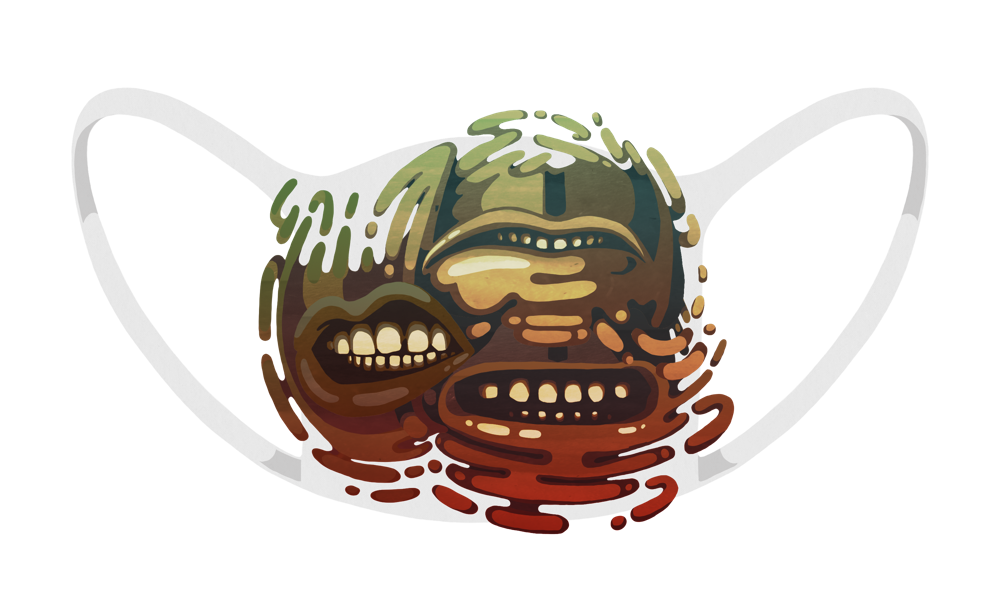Fetish of the Wretched
The Mask As Multivalent Signifier of Brutality

What is the meaning of the COVID mask? We start with the most obvious signals:
- It signals obedience to the fiction and therefore immunity to blame.
- It fosters an atmosphere of fear and contagion, which can be exploited when personally advantageous.
- It purchases moral authority with humiliating subjection, and therefore seeks to reduce all authority to this formula.
Yet it's widely known that the masks are ineffective: again this is essential to the power of the ritual. I've heard it called a "talismask": the riddle of this stupid and humiliating "face diaper" cannot be solved without plumbing the depths of the human capacity for magical thinking. As signifier, as power object, as a meaningless trifle which nonetheless and allthemore carries great portent: I find the most explanatory power in the old Freudian analysis of the fetish - therefore the reader must suspend that ever popular resistance to Freudian insight just long enough to gain a glimpse of clarity...
What is a fetish? It is an object which stands in place of something dangerous enough to be repressed beyond memory, but which must therefore be signified: it serves to restore the undetermined ambivalence of a state in which the repressed content never existed, and yet has the power to exist all the more as symbol. Of course the prototypical Freudian case is castration anxiety: that the meaning of any given sexual fetish can be traced back to the question of the possession of a penis should hardly surprise us. But in the case of the COVID mask we discover a new genera of fetish: a fetish of repressed aggression - or "castration desire" in the broadest sense.
The mask hides, the mask reveals. The mask denies, the mask confesses. It says, with a chant of tautological circularity:
- The pandemic is real: therefore we wear masks.
- The pandemic is unreal: because we all know the masks do nothing.
- And yet the pandemic is real: because we are all wearing masks.
At this point the definition of "real" begins to come under the sway of the magical: this is the power of ritual. A mass movement eventually needs nothing more than a tautology to convince millions: it seems rather to gain strength from the neatness of this arrangement - the Abrahamic religions have thrived for centuries by damning the unbeliever to a hell they should not logically believe in...
But not merely the questionable reality of the pandemic is caught up in this undetermined ambivalence, but the repressed aggression of the wearer:
"I'm not aggressive": the mask hides the mouth, the locus of the urge to consume. I will have to spend many pages attempting to convince the modern reader that the predatory urge remains very much alive in modern humanity: just as the Victorian age of sexual repression was a peak of hypertropic psychosexual neurosis, so our own time is a Cambrian explosion of petty, malicious, and highly inventive forms of "microaggression".
"I'm aggressive": the mask as confession of the desire for authority. The mask is a sign not only of obedience but of collective power over the body. In what context is the medical mask supposed to belong? To the hospital and the doctor. With the mask we "play doctor": in our time, the doctor is a kind of priest with power over the body, the one authorized to carry out violence against the body with a clear conscience, and serves as model of moral authority. In COVID everyone gets to play doctor, scientist, and thus 21st century priest. Moreover the mask instates an anonymity which simulates the anonymity of crowds: it's well known how violent otherwise docile people become, once they feel the safety of numbers and mass action. The mask has the power to transport the sign of anonymity and mass violence in portable form: it is anonymity and obedience which justifies police brutality.
Therefore the mask signifies doctor, policeman, obedient citizen, and pious believer all at once in diverse and orthogonal contexts: it can be no wonder that so many desperate hungry ghosts seem to want to extend the life of this manifold ritual object in perpetuity...
The fetish is an erasure that makes more present: just as hiding the genitals makes them more desirable, hiding the locus of the predatory urge makes the urge more uniform through repression and strengthens it through withdrawal. Just as a glimpse of genitals excites civilized people, in a COVID world a glimpse of an unmasked face excites the "nonviolent" crowd. How many of you have protested the mask, gone in public without it, only to discover for yourself a mumuring zombie-world of unconscious cannibalism gradually encircling your body, growing ever more bold as you lose your nerve? It is no hyperbole: anthropological and genetic evidence tells us that cannibalism was a global commonality not so long ago - the ritual of human sacrifice is not one hundreth as far away and impossible as we tell ourselves.
The mask erases: beauty and youth is erased; health and happiness is erased; independence and freedom is erased. And in that erased space appears a mutable signifier: not so much a fixed quantum of human worth - "one person, one mask" - but a sign of binding, a preemptive arrest, a prior "canceling", a subjugation to stupidity and a brand of the herd. The mask is a sign that here is a human being willing to preemptively sacrifice his dignity for the sake of belonging: thus it is a sign of ineligibity for sacrifice - there must be something of original value, else the mass violence is not an empowering sacrifice but merely garbage collection. Therefore it is not so much the achievement of a uniformly abject world that is desired, but to have pressured and lured the disobedient into the open where they can be hunted. We must constantly take note of how the circle of exclusion must be drawn tighter, the more subjugation succeeds.
Finally, I find one last important gratification at work: as a sign both of participation and social distance, the mask simultaneously generates a sense of belonging and individuality - finally "suffrage universel" is realized. The mask is therefore a signifier of that uniquely modern hypocrisy of equal status: it says "we're all the same" while also saying "I'm separate" - and should an unmasked face be encountered, the truly delicious form of "equality" can be employed: "we're all the same, but I'm better than you."
This is an excerpt from Bartholomy's book, The Moral Disease.


